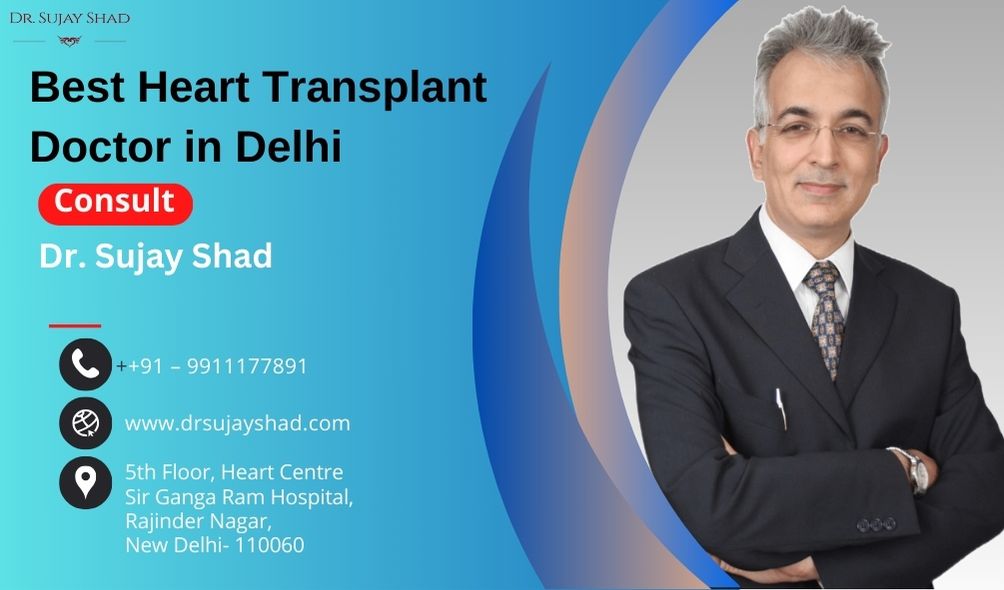|
Getting your Trinity Audio player ready...
|
A heart transplant surgery involves replacing a diseased or failing heart with a healthier donor heart. A heart transplant is a treatment that is usually reserved for people whose heart condition has not improved enough with medications or other surgeries. Learn more about this life-saving surgery with a Heart Transplant Doctor in Delhi, Dr. Sujay Shad. He is a leading heart surgeon who practices at Sir Ganga Ram Hospital and has performed successful heart transplants and other lifesaving heart surgeries in India.
How does Heart transplant surgery work?
Heart transplant surgery is an open-heart procedure that can take hours to be done. If the patient has previously undergone heart surgery, the procedure will be more complicated and more time-consuming.
The patient will be given general anesthesia, before the procedure. The surgeons will use a heart-lung bypass machine for patients to maintain oxygen-rich blood circulating throughout their bodies.
The surgeon will make an incision in the chest. The surgeon will detach chest bones and open the rib cage to operate on the heart.
After removing the diseased heart, the surgeon stitches the donor heart into place. The surgeon next connects the major blood vessels to the donor’s heart. When the blood supply is restored, the new heart usually begins to beat again. Sometimes, an electric shock is required to make the donor’s heart beat properly.
Patients will be given pain treatment medications following surgery. Patients will also have a ventilator to help them breathe, as well as chest tubes to drain fluids from the lungs and heart. Following surgery, the patient will receive fluids and drugs via intravenous (IV) tubes.
Things to Learn About Heart Transplant Surgery:
- A good candidate for a heart transplant
Individuals who have end-stage heart failure but are otherwise in good health may be considered for a heart transplant.
However, a heart transplant is not beneficial for everyone. A heart transplant is not recommended for the one who:
- Are at an advanced age, which could interfere with the ability to heal following transplant surgery
- Have another medical condition that could shorten life
- Have an active infection
- Have a recent medical history of cancer
- Are unable to make lifestyle changes necessary to keep donor hearts healthy, such as not drinking alcohol or not smoking.
2. When is heart transplant surgery performed?
When other treatments for cardiac issues have failed, heart transplant surgery is performed. In adults, heart failure can give rise to a weakening of the heart muscle (cardiomyopathy), coronary artery disease, heart valve diseases, congenital heart defects, dangerous recurring abnormal heart rhythms (ventricular arrhythmias) not controlled by other treatments and failure of a previous heart transplant.
3. Managing medicinal drugs, therapies, and a long-lasting care plan
After a heart transplant, taking all the medications as the doctor instructs and following a lifelong care plan is essential. The doctor might give instructions regarding the lifestyle, such as wearing sunscreen, not using tobacco products, exercising, eating a healthy diet, and being careful to lower the risk of infection.
4. Cardiac rehabilitation
Such initiatives incorporate exercise and education to improve health and recovery following a heart transplant. Cardiovascular rehabilitation, which can begin before a patient is discharged from the hospital, can help them restore strength and enhance their quality of life.
5. Follow-up care makes a difference
Close monitoring and follow-up, particularly in the months following surgery, is one reason why patients are now living longer lives after heart transplantation. Patients who have undergone a heart transplant become immunocompromised. They can become infected and develop kidney problems. The first six months after a transplant are the busiest months for follow-up treatment, with doctors seeing patients regularly. After the first six to eight months, subsequent follow-up becomes every three months, every six months, and every year.
6. An improved quality of life
Many people who undergo a heart transplant have an improved quality of life. Depending on the condition, the patient may be able to resume many of their daily life activities, such as returning to work, participating in hobbies and sports, and exercising.
7. Improved survival rates
Survival rates after heart transplantation differ based on several aspects. Survival rates continue to improve despite an increase in older and higher-risk heart transplant recipients.
8. Maintain a healthy weight
After a heart transplant, a patient may need to adjust their diet to keep their heart healthy and functioning well. Maintaining a healthy weight through nutrition and exercise can help patients avoid diseases like high blood pressure, heart disease, and diabetes.
9. Healthy food options after heart transplant surgery
Dietitians will provide several healthy food options and ideas for patients to use in their eating schedule.
Dietitian’s recommendations may include:
- Consume plenty of fruits and vegetables every day
- Eat whole-grain bread, cereals, and other grains
- Drink low-fat or fat-free milk to help maintain enough calcium in the body
- Eat lean meats
- Maintain a low-salt diet
- Avoid unhealthy fats, such as saturated fats or trans fats
- Avoid grapefruit juice due to its effect on a group of immuno-suppressant medications
- Avoid excessive alcohol
- Stay hydrated by drinking adequate water and other fluids each day.
Benefits of heart transplant surgery
- Most heart transplant patients live longer
- Heart transplant surgery provides higher energy levels to patients
- Heart transplant surgery improves the general well-being of patients
- Heart transplant surgery makes work and travel easier for patients.
Dr. Sujay Shad is a leading Heart Surgery Doctor in India who practices at Sir Ganga Ram Hospital. If one wants more details on this surgery they can consult Dr. Sujay Shad today!



